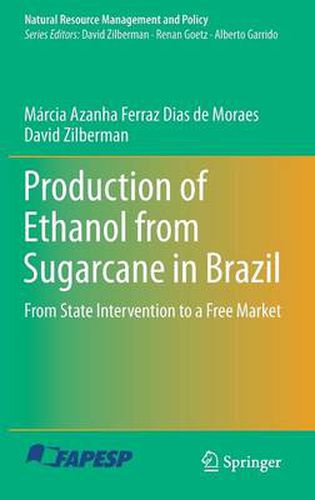Readings Newsletter
Become a Readings Member to make your shopping experience even easier.
Sign in or sign up for free!
You’re not far away from qualifying for FREE standard shipping within Australia
You’ve qualified for FREE standard shipping within Australia
The cart is loading…






This title is printed to order. This book may have been self-published. If so, we cannot guarantee the quality of the content. In the main most books will have gone through the editing process however some may not. We therefore suggest that you be aware of this before ordering this book. If in doubt check either the author or publisher’s details as we are unable to accept any returns unless they are faulty. Please contact us if you have any questions.
The success of Brazil in the large-scale production and use of fuel ethanol has been widely discussed and analyzed by other countries interested in adopting policies designed to encourage the use of biofuels. Within this context, certain questions arise: Could the Brazilian experience be replicated in other countries? What were the conditions that enabled the creation of the Brazilian Proalcool (National Ethanol Program and what lessons can be learned? To examine these issues, it is important to understand the functioning of the key, interconnected markets (those for sugarcane, sugar and ethanol), which, from their inception, were the objects of extensive government intervention until 1999. Two main conditions enabled the creation of Proalcool: robust production of sugarcane and sugar (tightly regulated by the government, which applied the numerous regulations then in place); and the military regime that was in place at the time, whose decision-making and enforcement powers were quite broad, facilitating the carrying out of the necessary actions, as well as making it easier to coordinate the activities of the various stakeholders and sectors involved. This book increases understanding of the functioning of the sugarcane supply chain in Brazil, not only during the phase of government intervention but also in recent years (in the free-market environment). The lessons, positive and negative, gleaned from the Brazilian experience can contribute to reflection on and the development of alternative modalities of biofuel production in other countries, making the book of interest to scholars and policy-makers concerned with biofuel and renewable resources as well as economic development.
$9.00 standard shipping within Australia
FREE standard shipping within Australia for orders over $100.00
Express & International shipping calculated at checkout
This title is printed to order. This book may have been self-published. If so, we cannot guarantee the quality of the content. In the main most books will have gone through the editing process however some may not. We therefore suggest that you be aware of this before ordering this book. If in doubt check either the author or publisher’s details as we are unable to accept any returns unless they are faulty. Please contact us if you have any questions.
The success of Brazil in the large-scale production and use of fuel ethanol has been widely discussed and analyzed by other countries interested in adopting policies designed to encourage the use of biofuels. Within this context, certain questions arise: Could the Brazilian experience be replicated in other countries? What were the conditions that enabled the creation of the Brazilian Proalcool (National Ethanol Program and what lessons can be learned? To examine these issues, it is important to understand the functioning of the key, interconnected markets (those for sugarcane, sugar and ethanol), which, from their inception, were the objects of extensive government intervention until 1999. Two main conditions enabled the creation of Proalcool: robust production of sugarcane and sugar (tightly regulated by the government, which applied the numerous regulations then in place); and the military regime that was in place at the time, whose decision-making and enforcement powers were quite broad, facilitating the carrying out of the necessary actions, as well as making it easier to coordinate the activities of the various stakeholders and sectors involved. This book increases understanding of the functioning of the sugarcane supply chain in Brazil, not only during the phase of government intervention but also in recent years (in the free-market environment). The lessons, positive and negative, gleaned from the Brazilian experience can contribute to reflection on and the development of alternative modalities of biofuel production in other countries, making the book of interest to scholars and policy-makers concerned with biofuel and renewable resources as well as economic development.